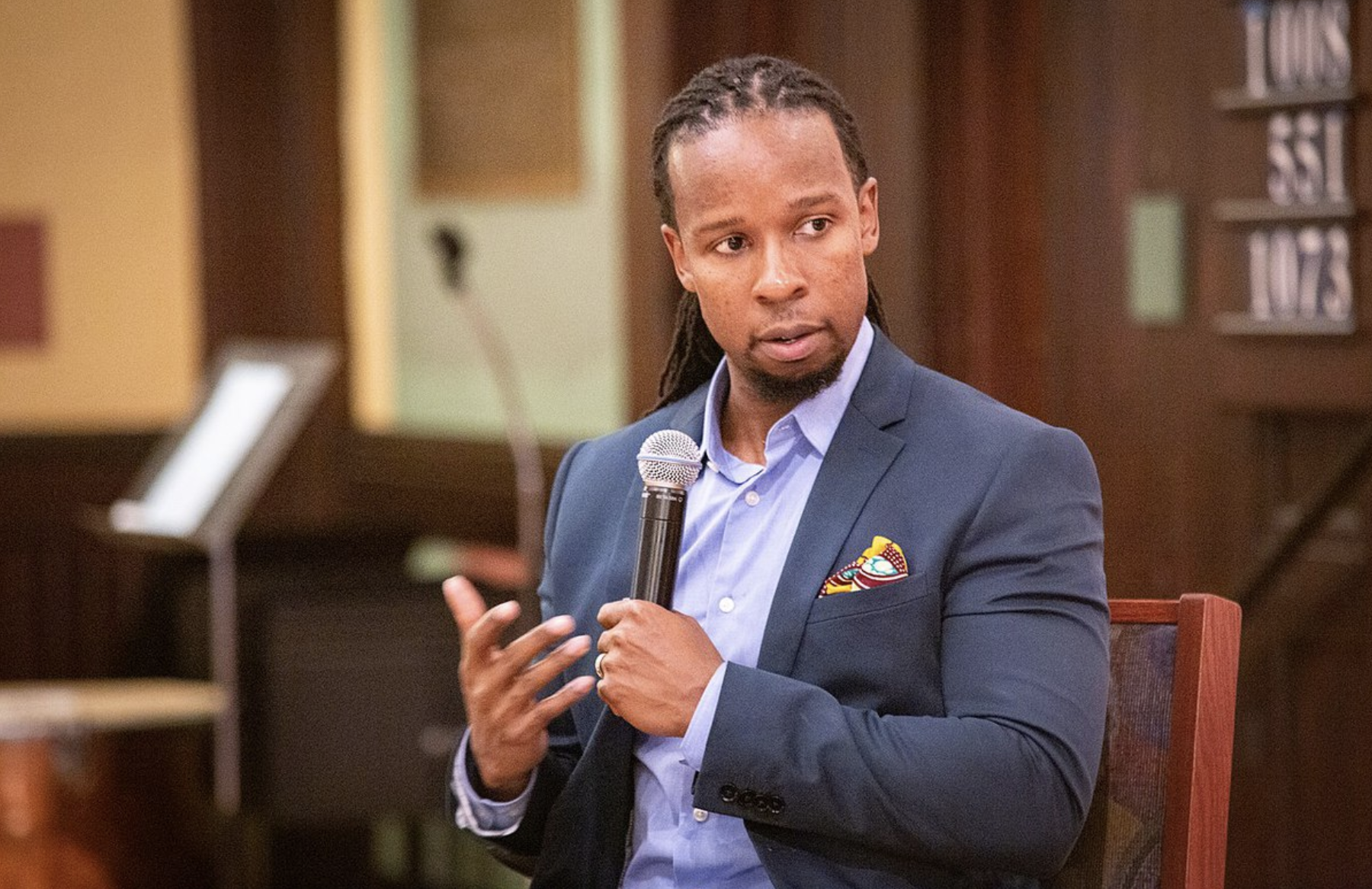YAA and Belonging at Yale host conversation with Ibram X. Kendi
Professor Matthew Frye Jacobson led an hour-long in-depth conversation with acclaimed author, historian and professor Ibram X. Kendi about reorienting America on issues of race, justice and equality.

Wikimedia Commons
This Wednesday, 1,097 students, faculty and alumni joined a virtual talk with Ibram X. Kendi hosted by the Yale Alumni Association and Belonging at Yale.
Matthew Frye Jacobson, professor of American Studies and History and moderator of the event, introduced Kendi as the author of three #1 New York Times bestsellers and one of Time Magazine’s 100 most influential people in the world in 2020. The conversation honed in on the question of how to be an antiracist, the title of Kendi’s 2019 book. The discussion also featured topics of white allyship, microaggressions, the power of education, interventions and the urgency of action in the current historical moment.
“The fundamental question for the individual is, are we challenging or holding systemic racism?” Kendi said at the event. “We should all be striving to be advocates.”
The event began with an introduction by Secretary and Vice President for University Life Kimberly Goff-Crews ’83 LAW ’86. She leads Belonging at Yale, the University’s initiative to “address diversity, inclusion and belonging” and support a culture in which “all members of our community feel they are understood, respected, and belong,” Goff-Crews wrote in an email to the News.
Goff-Crews then introduced Jacobson and mentioned that over 1,000 individuals registered for the event. In an email to the News before the event, Goff-Crews described her anticipation for the talk.
“I admire [Kendi’s] work, and I am looking forward to talking with him on Wednesday before I open the event,” Goff-Crews wrote. “I am excited to listen to him engage with Professor Jacobson … and to hear him answer questions from participants. Both Dr. Kendi and Dr. Jacobson have considerable wisdom to share with us.”
Jacobson began the talk by presenting the difference between not being racist and being actively antiracist. He asked Kendi for a deeper explanation. Kendi responded by saying that being antiracist is supporting a policy that leads to equity between racial groups and that people often view the terms “racist” and “antiracist,” as “fixed” terms, rather than as “descriptors.”
“His work in antiracism is basically arguing our good intentions are not enough, and it is not enough to not be racist — you have to actually actively be antiracist, which is a whole other piece of work,” Jacobson said. ”We really need to still struggle with this.”
Kendi then answered a question about the intentions of white allies. In response, he said that “too often, intentions are used as a defensive fort of mechanism” and that “we should be outcome-centered and victim-centered” rather than focusing on the perpetrator of racism.
Associate Professor of Molecular, Cellular and Developmental Biology Valerie Horsley, who attended the event, highlighted this discussion of intentions as her biggest takeaway from the conversation.
“[There is an] importance of understanding the cumulative toll of racism on black people,” Horsley wrote in an email to the News. “[He explained that] intentions are not defenses for actions that are rude or insulting.”
Jacobson then shifted the conversation towards the power of the accumulation of microaggressions. Kendi explained the misconception that exists in the perpetrators of microaggressions — their inability to expand their perspective past their individual experience. Kendi continued in saying that “people of color don’t experience [microaggressions] in isolation.”
In an email to the News after the event, Jacobson described how he, along with Kendi, believes that the use of certain language and conceptions of “inclusion” or “belonging” in various settings instead of “desegregation,” “integration” and “solidarity” can serve as microaggressions and actually undermine equality and equity.
“The work of desegregation that was begun generations ago has never been fully completed; in historically white institutions like Yale significant barriers remain, true equity has yet to be achieved,” Jacobson wrote in the email. “Meaningful antiracist solidarities are not yet the rule [and we] cannot resolve this without naming it correctly and facing it squarely.”
At the talk, Kendi also described defining stages in his life and how the presidential election in 2000 and stories of disenfranchisement allowed him to shift his ideology from maintaining the belief that “something was wrong with Black youth” to seeing that Black youth were not the problem.
Kendi also expressed the cruciality of educating communities, raising questions about how education teaches people to challenge and disrupt the institutional “power and policy” that foster systemic racism.
“I was struck by his response regarding education [and] I have begun to think of ways that we as an institution and society can address institutional racism and its impact,” Horsley said. “Dr. Kendi emphasized the need to go beyond education and to change policies. We can’t just have education for education[’s] sake.”
Then, Kendi continued to connect the current “moment of national reckoning” to similar moments in history. He spoke about neo-confederalism — in which groups of individuals believed that states previously in the Confederacy should again secede and form their own nation — and Jim Crow laws. Kendi added that “we’re at a stage of awareness, and we’ve been at this stage previously.”
When speaking about how this conversation applies to the Yale community, Kendi brought attention to his belief that there can be “bodies of people of color at a historically white institution” without those bodies of people actually belonging at that institution — something contingent upon whether or not there are multiple standards, cultures, perspectives and histories that are simultaneously centered, he added.
The talk concluded with audience questions on federal reparations, suggestions for interacting with racist family members, the relationship between electoral politics and street-level activism, enlisting allies and advice for coalitions of student groups. Over 100 questions were submitted before and during the talk.
When asked about how he endures and remains inspired, for instance, to work on his new book, “Four Hundred Souls: A Community History of African America, 1619-2019,” Kendi said that he thinks “the love and the empathy becomes fuel for [him] day in and day out.”
The conversation with Kendi is the second in the Antiracism Speakers Series, developed within Belonging at Yale after the police killings of George Floyd, Breonna Taylor and many others. Two more events will follow in the spring.
Amelia Lower | amelia.lower@yale.edu








